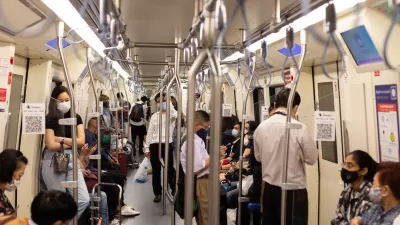Welcome to the age of "Dashboard Governance"—when a good user interface offers the potential for performance advantages to city management.
Shannon Mattern describes the adoption of "Mission Control" style urban dashboards in city governments all over the world. Mattern introduces the idea of the urban dashboard at the beginning of the long article:
"We know what rocket science looks like in the movies: a windowless bunker filled with blinking consoles, swivel chairs, and shirt-sleeved men in headsets nonchalantly relaying updates from “Houston” to outer space. Lately, that vision of Mission Control has taken over City Hall. NASA meets Copacabana, proclaimed the New York Times, hailing Rio de Janeiro’s Operations Center as a 'potentially lucrative experiment that could shape the future of cities around the world.'"
Mattern lists some of the governments that have adopted futuristic control rooms, such as Baltimore, London, Michigan, and the United Kingdom (the Boston Globe reported last year that new(ish) Boston Mayor Martin J. Walsh is also a believer).
As for the implications of such technology, Mattern describes the urban dashboard as a key indicator of an evolving understanding about cities: "They don’t seek merely seek [sic] to display information about a system but to generate insights that human analysts use to change that system — to render it more efficient or sustainable or profitable, depending upon whatever qualities are valued."
Mattern goes on to provide a history of the rise of urban dashboards. Included in the number of the most recent experiments, for example is the work of a "group of Europen cities…collaborating on the development of urbanAPI, which proposes to help planners engage citizens in making decisions about urban development."
The long form article includes a lot more on the history and potential of dashboards and their relevance to the concerns of planning-related fields.
FULL STORY: Mission Control: A History of the Urban Dashboard

Planetizen Federal Action Tracker
A weekly monitor of how Trump’s orders and actions are impacting planners and planning in America.

Maui's Vacation Rental Debate Turns Ugly
Verbal attacks, misinformation campaigns and fistfights plague a high-stakes debate to convert thousands of vacation rentals into long-term housing.

San Francisco Suspends Traffic Calming Amidst Record Deaths
Citing “a challenging fiscal landscape,” the city will cease the program on the heels of 42 traffic deaths, including 24 pedestrians.

Amtrak Rolls Out New Orleans to Alabama “Mardi Gras” Train
The new service will operate morning and evening departures between Mobile and New Orleans.

The Subversive Car-Free Guide to Trump's Great American Road Trip
Car-free ways to access Chicagoland’s best tourist attractions.

San Antonio and Austin are Fusing Into one Massive Megaregion
The region spanning the two central Texas cities is growing fast, posing challenges for local infrastructure and water supplies.
Urban Design for Planners 1: Software Tools
This six-course series explores essential urban design concepts using open source software and equips planners with the tools they need to participate fully in the urban design process.
Planning for Universal Design
Learn the tools for implementing Universal Design in planning regulations.
Heyer Gruel & Associates PA
JM Goldson LLC
Custer County Colorado
City of Camden Redevelopment Agency
City of Astoria
Transportation Research & Education Center (TREC) at Portland State University
Jefferson Parish Government
Camden Redevelopment Agency
City of Claremont





























